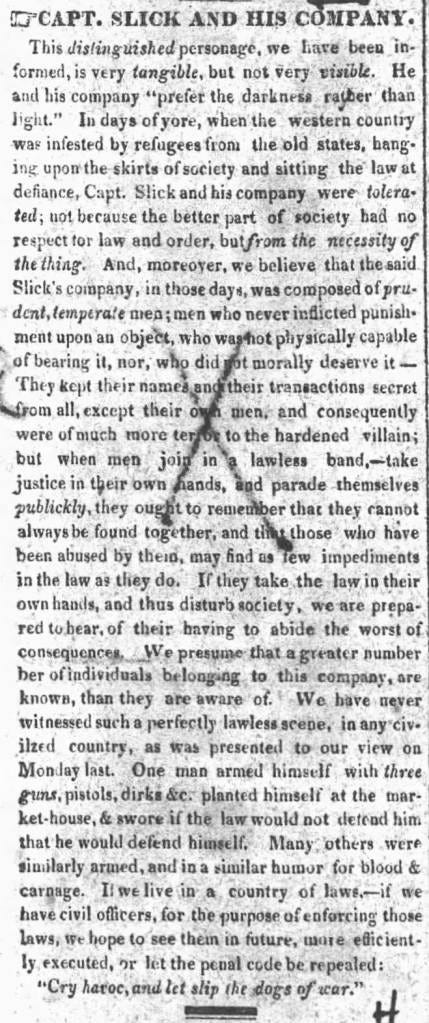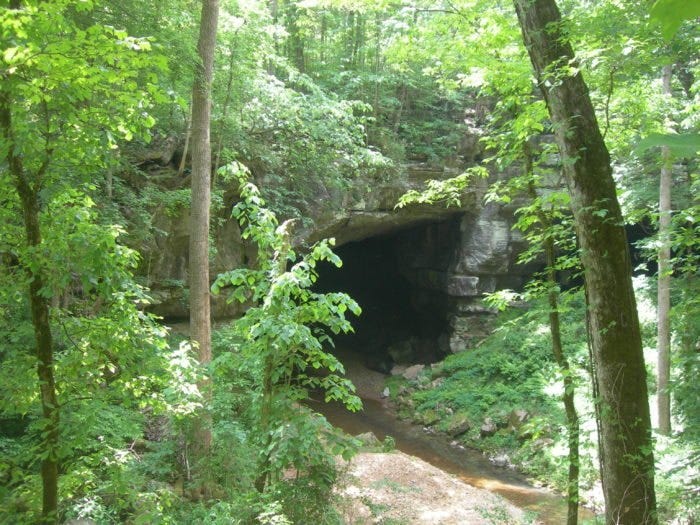Slick Law: Vigilante Justice Gone Sour
Not every area had a courthouse, so wait times for justice were long, if justice came at all. Sometimes people didn't agree with the judge. So what did people do when they didn't have or trust the law? They made their own vigilante justice group.
This is my part in the Historical Writer's Forum summer blog hop on momentous events. I think this blog concludes a momentous year after January of 1836 when certain settlements became counties and transitioned to the court system. If you want to know why I chose this topic in relation to my family saga series, scroll all the way down.
What is Slick Law, anyway?
In short: vigilante justice.
Every time I read a journal or collection of memories, I learn something surprising. This comes at the expense of countless hours fighting my adorable dog for the little green couch, with laptop at hand. This time the mystery lay in the writings of Rev. J. D. Anthony of his early days in Cherokee County, Alabama. Slick Law ruled the county before courthouses appeared (first circuit court was 1836).
Anthony describes a man called Captain Whips, who lived near Mud Creek and carried a wagon whip with which to...whip people, of course. He was an "old man of small dimensions, in every sense of the term, except, it might be truthfully said, that he far excelled all mankind in indescribable ugliness." Unrelated to the man's looks, his group didn't appear to have much discretion in other areas.

According to Anthony:
"Many good men had gone into this company for the noble purpose of protecting themselves in their rights in life and property; but there were many other, and doubtless by far the greater portion, who had joined for no other purpose than to be protected in their own rascality. Many a poor Indian lost his pony, his cows, and hogs, by the base villains, who screened themselves behind the specious show of "slick law." Any new comer among the whites, who chose not to cast his lot with these ruffians, was sure to bring down their ire upon his unfortunate head...."
"...Shortly after our arrival these sticklers for law and order "slicked" an old man by the name of Hendricks, i.e. they gave him about two hundred lashes on his naked back. They then determined to "slick" his son Joab, who lived near where Porterville in DeKalb county now stands. They took both the Hendricks across the Georgia line to "slick" them. The work was done near the residence of a Mr. Dempsey. Whether Dempsey or Whips did the "slicking," or whether they divided the job between them, I never knew. Some years after, while Dempsey was sitting quietly in his house, some one gave him the contents of a double barrel shot-gun. He was thus made a cripple for life. I never learned who Dempsey accused with furnishing him with that supper of Blue plums. Every one else attributed it to the hospitality of the Hendricks', and regarded it as the last note in the funeral dirge of Alabama "slick law."
http://www.genealogytrails.com/ala/cherokee/his_cherokee.html
When the first court session came about, the Slicks were hell-bent on keeping Hendricks from testifying against them, but well-armed citizens surrounded the building (somebody's home) and kept peace. So the Slicks "skulked away and sought refuge in more savage climes."
Slick Company in Chambers, AL.
According to E. G. Richards of Chambers county, thieves used local caves to hide their bounty and make an elaborate scheme with which to entice enslaved people to run away, hid in the caves, and permit themselves to be sold in exchange for half the money and help escaping to free states. The Slick Company would then hunt down these thieves, whip them, and make them leave the county.

The Chambers Slick Company met its end when they decided a hotel guest was suspicious. They broke into the hotel, got into a shootout, dragged him out and tied him to a tree, whipped him, and sent him and his wife away. The hotel owner sued the entire group for damages and an assault on her guests. Some of them ran away, others paid up, but that was the end of the Slick Company.
Slick Law probably happened all over Alabama and Georgia.
If you only consider J. D. Anthony's tale, the Sicks roamed from the Tennessee River to the Creek Nation border, but until 1836 Chambers county lay within the Creek borders. I think the Slicks would have hunted people who used caves in any county. Jackson County alone has over 700 caves. The Aniyvwiya/Cherokee who lived in Northern AL had been termed many variations of "people of the caves" by other Nations.
In order to fully understand Slick Law one must also take a look at Lynch's Law. The two terms are used interchangeably by newspapers in the area.
Lynch's Law
The Mirriam Webster Dictionary defines Lynch's Law as:
Punishment of presumed crimes or offenses usually by death without due process of law.
“Lynch law.” Merriam-Webster.com Dictionary, Merriam-Webster, https://www.merriam-webster.com/dictionary/lynch%20law. Accessed 12 Jul. 2020.
Lynch's Law has a couple origin stories, but one story dominates. Charles Lynch, a Justice of the Peace AND a Quaker (of all things), during the American Revolution started the practice and the term. He employed questionable tactics against Loyalists and appealed to have his actions retroactively justified by law. Thomas Jefferson warned him that it could turn really sour if he did not.
This is the common problem with taking justice into our own hands: we risk punishment ourselves, or making horrible mistakes, as one can see from the short-lived Slick Law groups. For more on Charles Lynch check out the links below.
Judge Lynch
Judge Lynch was Lynch Law personified, and this term got more traction in the 1800s. Generally the group of people doing the lynching (not always death) were the judge, or they made a mock trial and appointed somebody to be a judge. A good portion of the lynchings during pre-reconstruction happened over theft, or anyone helping enslaved people gain freedom, which is a sobering thought. It's more than aggravating that "theft of oneself" was considered a thing.
I put some links at the end of this post for further reading on lynching during post Reconstruction.
Why Explore this Topic for my Series?
The rapid deterioration of vigilante justice is part of what drives my characters to change course.
First up is an exploration in what justice means to different people, and how taking it into our own hands can harm, enable, or free others. Horrible mistakes occur when involved with the wrong people who claim they are seeking justice.
I want certain characters to be part of a vigilante justice group, but one that even the Slicks would shy away from. This group is quick, quiet, and won't proclaim they stand in for the law. They do their acts alone and it becomes a matter of legend because nobody knows who they are. One of them will have good sense to part ways when things get bad, but his mistakes will cost him dearly. As one character likes to say: "You can wash blood off your hands, but it'll stain your soul."
There are a lot of good blogs this month! Check out the other blogs on the blog hop page
Further reading
Maps
https://digitalcollections.libraries.ua.edu/digital/collection/u0005_0000003/id/95/rec/1
Views from early settlers
http://www.genealogytrails.com/ala/cherokee/his_cherokee.html
https://books.google.com/books/about/Life_and_Times_of_Rev_J_D_Anthony.html?id=G9tEAAAAYAAJ
http://www.genealogytrails.com/ala/chambers/history_chambers.html
Slick Law, Captain Slick, Captain Whips
https://www.alabamapioneers.com/the-true-story-of-the-slicks-a-vigilante-gang/
https://www.alabamapioneers.com/the-slick-law-ruled-in-the-early-day-of-cherokee-county-but-it-was-vicious/
https://www.fold3.com/page/109755948-the-cherokee-indians/stories
Charles Lynch and Judge Lynch
https://scholarship.richmond.edu/masters-theses/102/
https://infogalactic.com/info/Charles_Lynch_(judge)
http://www.avocamuseum.org/lynch
https://www.merriam-webster.com/dictionary/Judge%20Lynch
Post reconstruction reading
https://www.history.com/news/lynching-museum-alabama-national-memorial-for-peace-and-justice
http://digital.archives.alabama.gov/cdm/ref/collection/voices/id/2516
https://www.history.com/news/the-grisly-story-of-americas-largest-lynching



